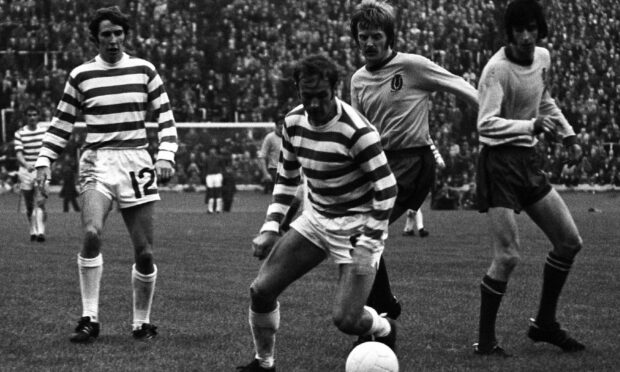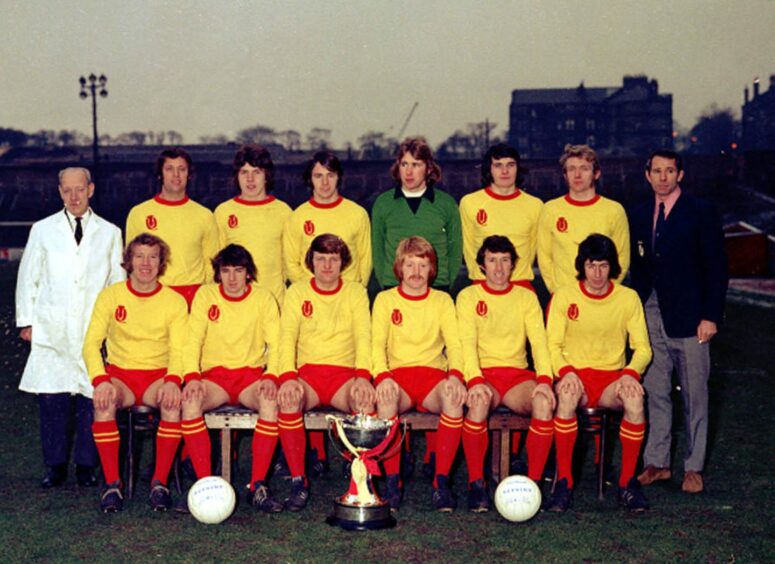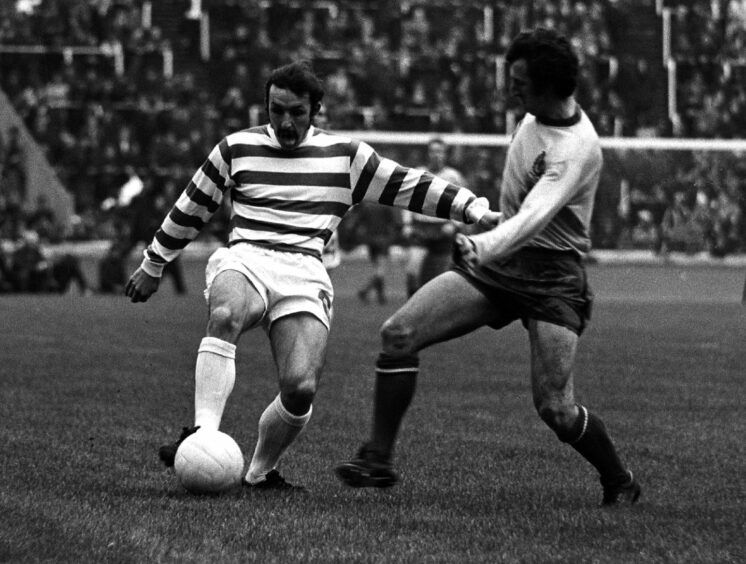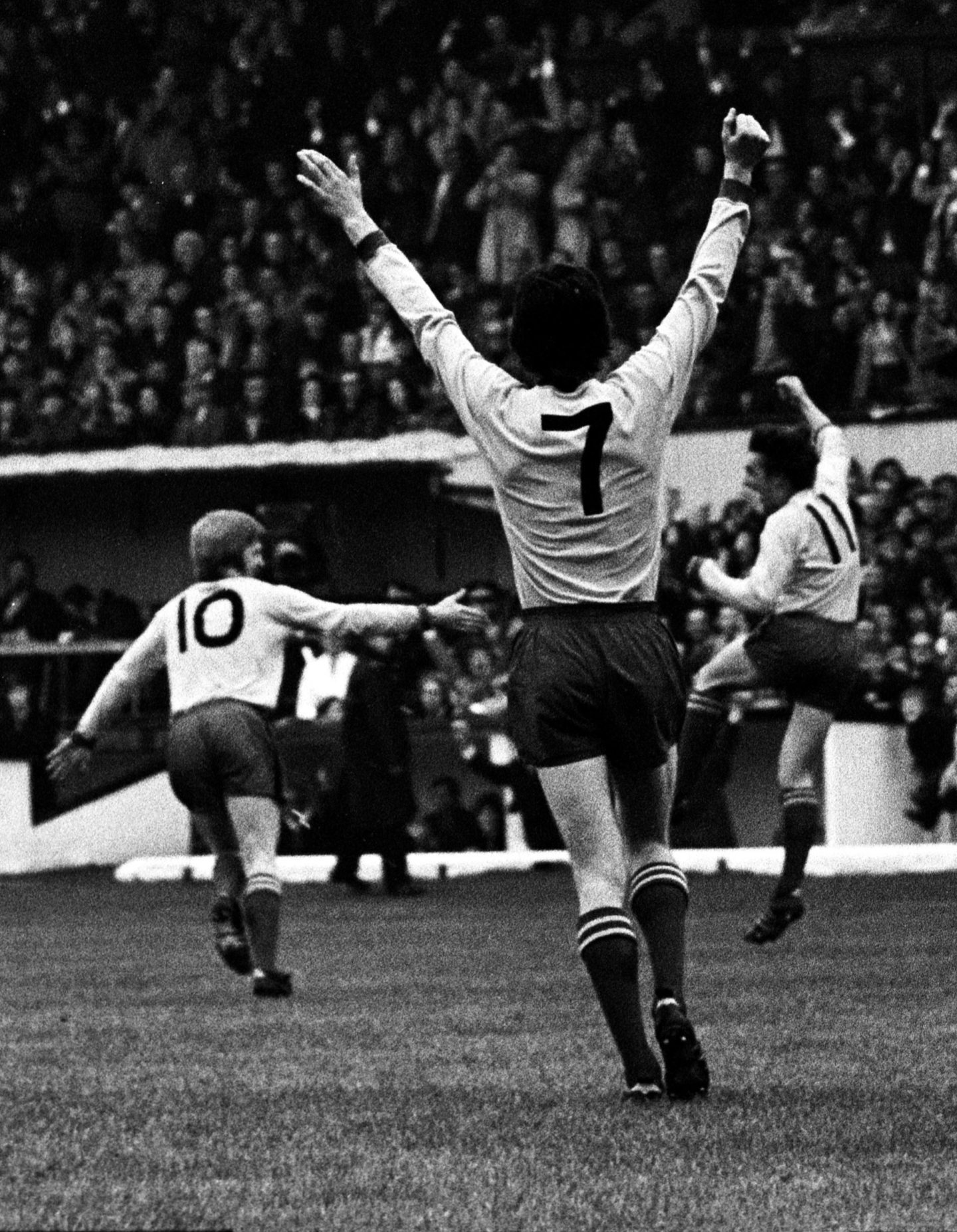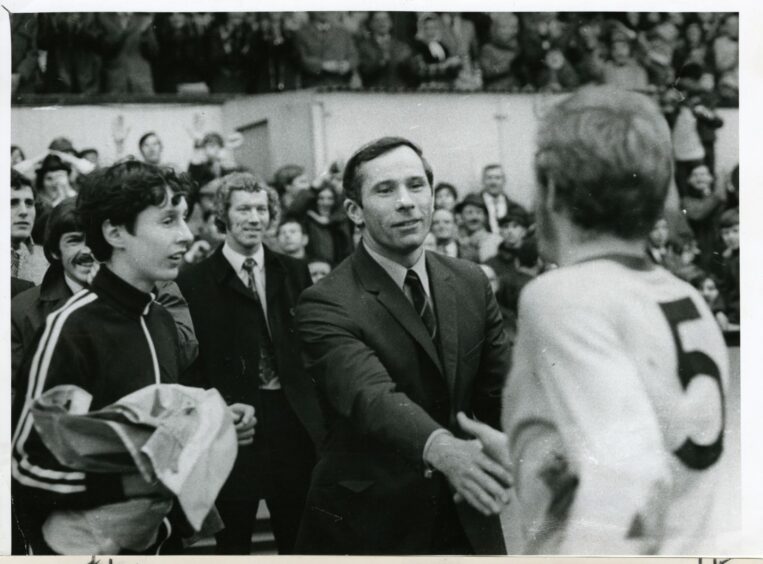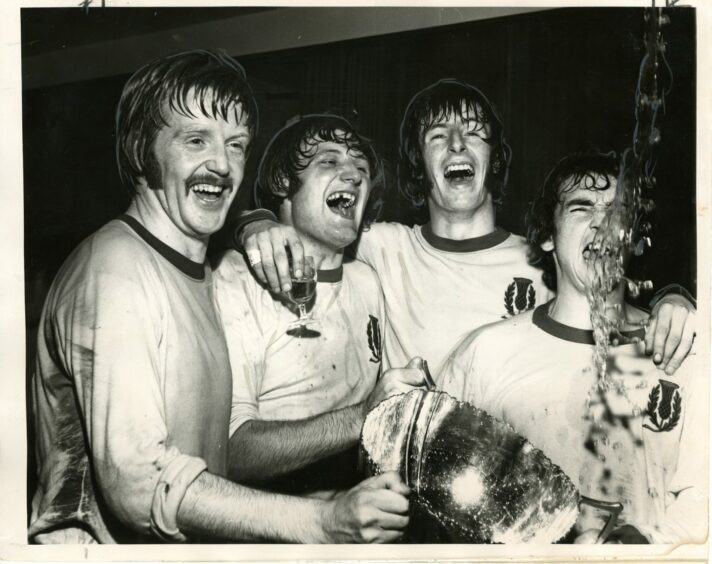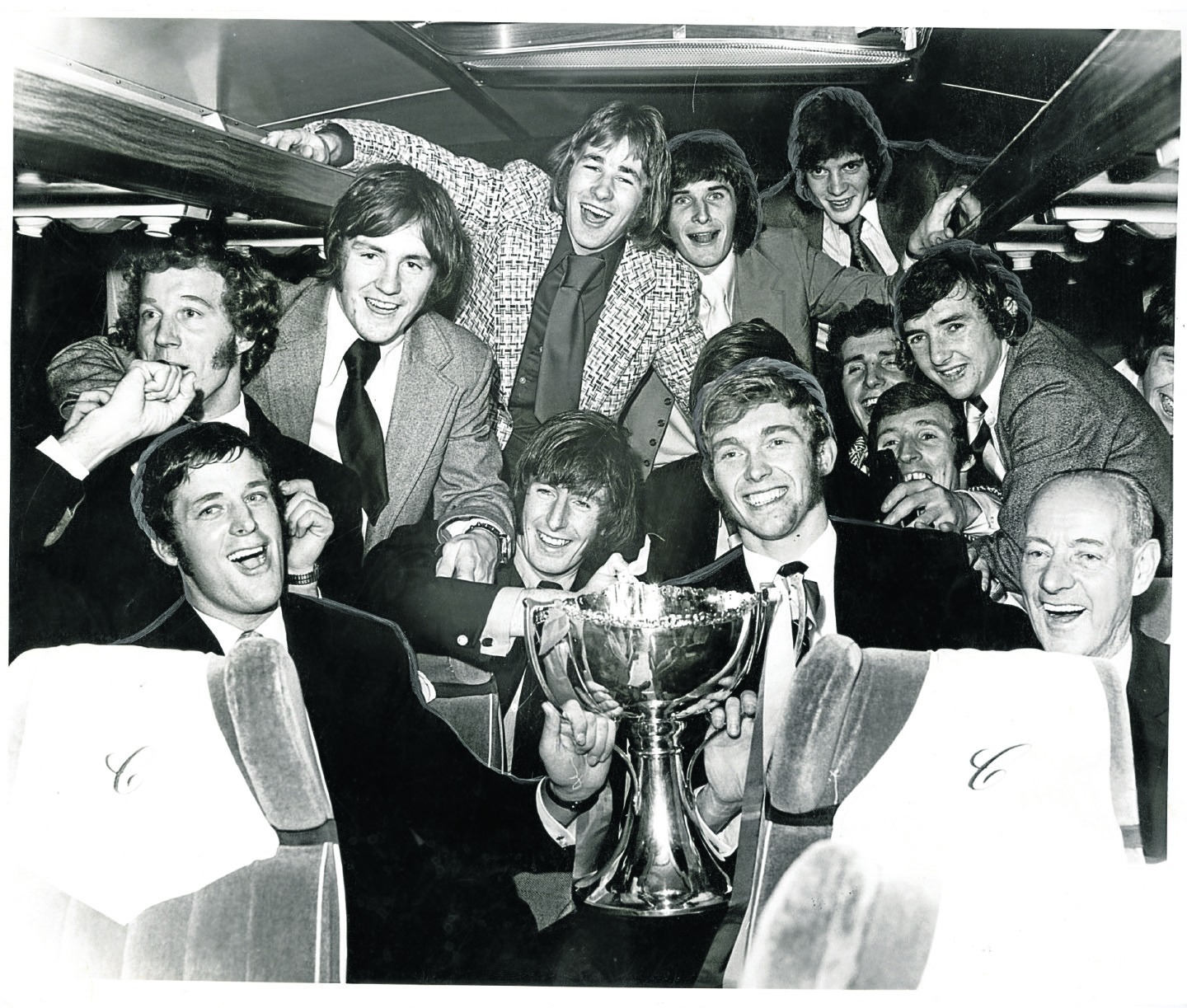Sam Leitch, the normally prescient BBC sports presenter, had no doubts about the outcome of the 1971 Scottish League Cup final.
In the one corner were Celtic, masterfully managed by Jock Stein, whose Lisbon Lions, captained by Billy McNeill, had famously triumphed in the European Cup in 1967 and reached the final of the same competition in 1970.
In the other were Partick Thistle, a team with a reputation as perennial bridesmaids – if they even received an invitation to the wedding – in the Glasgow goldfish bowl.
On the eve of the combatants’ climactic meeting at Hampden in October 50 years ago, Leitch dismissively told his audience that the Maryhill Magyars had “no chance”.
Yet, in what turned into one of the most extraordinary occasions in the history of Scottish football, Thistle didn’t merely create a sack-load of opportunities, but scored no less than four times in the opening 37 minutes as all their dreams came true.
The cup was a true test of stamina in those days. Davie McParland’s Thistle squad, which featured a clutch of youngsters, including Alan Rough, John Hansen (brother of the more famous Alan), Ronnie Glavin and Denis McQuade, disposed of Arbroath, Raith Rovers, East Fife and Alloa, en route to the last eight.
But they were beaten 2-0 in the first leg of their quarter-final tussle with St Johnstone and an uphill battle loomed.
The Old Firm had bigger fish to fry than worrying about dear old Thistle.”
Alan Rough
Undaunted, when the clubs met again a week later, Partick secured an emphatic 5-1 win in Glasgow and that outcome provided the momentum for them to defeat Falkirk – who had previously prevailed against Aberdeen, Dundee and Hibs – and progress to the final for the fourth time.
In the earlier contests, they had suffered reverses against East Fife, Celtic and Hearts, and there was no huge confidence they could halt that sorry trend against Stein’s all-conquering squad, who were in the midst of their nine-in-a-row championship charge.
Yet there was no pressure on them, either. And they were determined to prove they could make a name for themselves in the spotlight and in front of the TV cameras.
Alan Rough, who later represented Scotland at three World Cups, spent the morning of the match in charge of his Boys’ Brigade team – and the kids won their match 3-2.
Meanwhile, at home, his mother Jean had ironed his kit in readiness for her son heading off to join the rest of the Partick players at Esquire House for a meal.
He made the journey via the No 11A bus at Knightswood and found himself surrounded by Celtic fans who were discussing how many goals their heroes would amass.
As he recalled: “I was sitting in the top deck and none of the folk in green and white had a clue who I was, but the general tone of their conversation was ‘We’ll murder this lot’ and ‘How the hell did Partick Thistle get this far, anyway?’
“I remember a couple of their more middle-aged supporters asking me: ‘Well, son, are you going to Hampden to watch the Bhoys collect another trophy?’
“I just smiled, mentioned that I had to meet my family for a meal, and hoped they enjoyed a pleasant afternoon.
“It definitely wasn’t the time or place to be shooting my mouth off. But this was the response we had grown used to at Firhill: the Old Firm had bigger fish to fry than worrying about dear old Thistle.
“In a way, that was a good thing and I was pretty relaxed before the kick-off.
“Bear in mind I was just 19, we were massive underdogs, and nobody – not even our own fans – were giving us a prayer. So we could go out and express ourselves with no fear.
“The next couple of hours passed in a glorious whirl.”
Davie McParland told his men it would be crucial to keep the elusive Jimmy Johnstone on a tight leash and Ronnie Glavin was assigned the thorny task of marking the diminutive, but often deadly, winger.
But he reminded his charges that Celtic were missing their talismanic skipper, McNeill, and that everybody, be it pundits, bookies or the press, had written off Thistle.
Rough said: “I don’t recall there was any anxiety among our guys. Instead, there was a shared feeling that these kind of high-profile matches don’t come along very often for a club like ours, so it was time we stepped up to the plate and did ourselves proud.”
Nobody could question they achieved that objective once the action commenced.
We knew they would come hard at us.”
Alan Rough
There was a fizzing energy and effervescence about the Partick contingent from the outset. And a rather lethargic, stumbling display from Celtic by comparison.
The consequences were spectacular. First, Alex Rae confounded goalkeeper Evan Williams with a 20-yard lob for the opening goal in the 10th minute, then Bobby Lawrie, a pacy, dangerous performer, cut inside Davie Hay and doubled the lead.
Almost immediately thereafter, Johnstone was forced to leave the field with an ankle injury and Thistle pounced again when McQuade netted on the half-hour mark.
And, if you listened to the crowd, it was as if Hampden was shrouded in disbelief; an atmosphere that heightened when Jimmy Bone added a fourth.
This was the stuff of fantasy for somebody such as Rough, who barely had to lift a finger at the other end of the pitch while his colleagues were wreaking havoc.
‘I couldn’t believe what I was watching’
He said: “I could have been sitting in a deckchair, reading a paper, for all I had to do. When Rae grabbed his goal, I was like: ‘Hang on, we’ve scored’.
“Then, I was splurting: ‘Jeez, there’s another one’ when it became 2-0 and I had to battle to keep my emotions in check, because it was unbelievable.
“By the time it got to McQuade and Bone’s efforts, I was rubbing my eyes and saying over and over: ‘Oh my God, Oh my God, what on earth is happening here?
“It was like nothing any of us had ever experienced before. It wasn’t all one-way traffic and Celtic carved out a couple of chances, but we were 4-0 in front and as we walked into the dressing room at the interval, I have never witnessed so many stunned expressions as we sat down and took a breather.”
Okay, let’s get ready for the big backlash
He continued: “There was no singing or wild celebrations from us at the break. If anything, the mood was more bewilderment than anything else – had we really gone out there at the national stadium in a major final and stuck four past Celtic?
“Most of us were inwardly aware that, given our reputation and the talent in their ranks, there was a risk we could still end up losing 6-4 or 7-4. But credit to Davie, he allowed us to collect our thoughts and catch our breaths and he was remarkably calm.
“He told us very quietly: ‘You have done half the job, lads. I’m proud of you. Now, go out there and finish it’.
“And that was it. We knew they would come hard at us. But we all felt we had enough resilience, ambition and guts to hold them at bay.”
As expected, Celtic made a better fist of things in the second half and rampaged forward menacingly.
Rough had to produce a couple of decent saves to thwart the elusive Kenny Dalglish, but this was nothing to rival the Siege of Mafeking.
By the hour mark, the news of the scoreline had spread around Glasgow and Rangers fans flocked from Govan to join the Hampden throng as the shockwaves reverberated.
Eventually, after 70 minutes, Dalglish broke Celtic’s duck, but it was the only time Rough was beaten and there were no further signs of a miraculous recovery.
As the perm-wearing goalie said: “Anybody who still clings to the idea that our victory was a fluke should face reality.
“We were the better team on the day – and you might fluke one goal in any match, but not four.
“So it’s doing a disservice to Partick to bang on about Celtic’s shortcomings and even their fans who stayed to the end applauded our performance.”
It was only later it emerged that a BBC sports announcer had refused to believe the interval score and informed viewers that the network would “check it out”.
Yet as the Thistle players marched up to collect the League Cup, they knew they had produced a stunning display that made a mockery of the pre-match forecasts.
McParland was effusive on the greatest afternoon of his life, but Stein was gracious as well and talked about the pride and passion he had seen in the Partick ranks.
And, as he added: “In a cup final, it’s sometimes about who wants it more. They were on their game right from the first whistle. We weren’t. And they made us pay.”
As the Partick players and staff made their way towards their fans with the trophy, there was understandable euphoria at how they had created history.
But, as they hastily tried to organise an impromptu celebration, it soon became clear that nobody, not even the Firhill club’s own officials, had remotely considered the possibility they might actually beat the Stein machine.
Rough recalled: “In the circumstances, we were entitled to an open-top bus parade, but no one had thought to book such a vehicle, so we ended up commissioning a single-decker bus and attempted to clamber through the skylight.
“Eventually, a few of us managed to clamber on to the top of the bus, but it was a wee bit embarrassing – we were driving along and people in the street were watching and wondering who the hell we were.
“By then, we had realised that most of our supporters would still be in the pubs around Hampden.
“And then, once we had arrived back at Firhill, we found the place was locked. So yes, there’s no doubt that it was all a bit chaotic.”
There were tangible benefits for Thistle from their Hampden heroics. For one thing, their youngsters had demonstrated their talents on the national stage and several of them never looked back from that giddy achievement.
They had also qualified for the 1972-73 Uefa Cup – the second year of the tournament’s existence – and met Honved of Hungary, who beat them 4-0 on aggregate.
But despite their transient stardom, Rough was among those who were in their element and he concluded: “We were a collection of ambitious youngsters, and none of us had appeared in a cup final before, so we weren’t intimidated by the opposition or the occasion because we nothing to measure it against.
“And, in the next few years, quite a few of us, including myself, Ronnie Glavin, Jimmy Bone, Alex Forsyth and John Hansen went on to represent Scotland.
“So it wasn’t as if we were a bunch of no-hopers. We were Partick Thistle.”
Partick Thistle beat Celtic… then crash back to earth in Aberdeen
Thistle’s stars were, however briefly, in demand and the cocks of the walk. On the back of their Cup victory, they were invited on a pre-season tour to Malaysia and Indonesia.
But sadly, just a week after their giant-killing exploits, Partick ventured north to tackle Aberdeen at Pittodrie in the league.
And they were thrashed 7-2!
